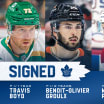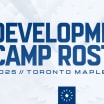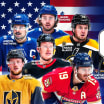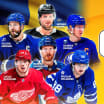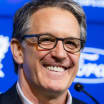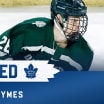Recognizing the contributions of veterans is an ingrained part of being a Canadian, taking a moment to pause and thank them for their services and sacrifices on November 11. From childhood, many of us recite the words to In Flanders' Fields, and in adulthood, it is second nature to sport poppies on our coats.
Maple Leafs recognize Indigenous Veteran's Day
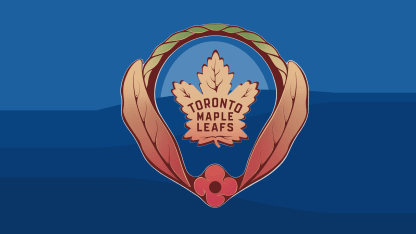
By
Kelly Boutsalis @KellyBoutsalis
Three days before Remembrance Day, is a day on the calendars that is rarely celebrated, despite it being just as important. Indigenous Veterans Day honours the First Nations, Métis and Inuit volunteers who have enlisted in the armed services.
They overcame many hurdles to serve, such as language barriers and racism, and at one point they were serving for a country that didn't recognize them as eligible to vote until the 1960s.
And yet, a high number of Indigenous people volunteered, with around 4,000 Indigenous soldiers fighting in the First World War, and was the largest ethnic group in Canada to enlist. In the Second World War, over 3,000 First Nations members enlisted. The actual number of Indigenous people who served in the armed forces is likely much higher, with an unknown number of Inuit, Métis and other Indigenous people.
Indigenous veterans brought their cultural experiences, like hunting skills, that transferred to soldiers becoming snipers and reconnaissance scouts, and their language became a tool for codetalkers to pass along coded messages.
Currently, there are over 2,700 Indigenous people still serving in the Canadian military.
As part of the Maple Leafs' recognition of Indigenous Veterans Day on November 8, Six Nations Veterans Association's Welby "Ike" Isaacs will be in attendance along with other veterans as honoured guests of the Maple Leafs for the game.
Isaacs is the second oldest living veteran from the Six Nations of the Grand River reserve, having joined the Canadian Army in December 1956. His time with the service took him to Germany in 1957-1959, Egypt with the United Nations as a peacekeeper in 1962-1963, and nine years with the Royal Canadian Dragoons Armoured Corp. He was honourably discharged in 1966.
It's a tremendous opportunity for the Maple Leafs to recognize and amplify Indigenous contributions in front of our fans, says Mark Fraser, Maple Leaf Sports & Entertainment (MLSE) Player Development, Equity, Diversity and Inclusion.
"With Remembrance Day around the corner, it's that time of year where we honour veterans who have served our country," he adds. "This is a moment to honour First Nations, Inuit and Métis people who have served our country and made very important sacrifices."
Fraser, who is also a Toronto Maple Leafs alumnus, says in preparation for the November 8 ceremony, the Equity, Diversity and Inclusion team has been having a lot of conversations and reaching out to Indigenous communities.
He adds that so many people who live in this country are proud to be multi-generational Canadians, but many non-Indigenous fans haven't taken moments to acknowledge the experiences of Indigenous people who have been here before it was a country named Canada.
"We have an obligation to leverage our influence in sport and act on the TRC's recommendations in a way that we know we can," he says. "We know that you don't necessarily need to be a sports fan or hockey fan to be aware of what the Toronto Maple Leafs are doing. It's why we find it important to use our voice, to educate ourselves and educate our fans."
The team also has a very passionate Indigenous fanbase, so in addition to the Maple Leafs using their various platforms to bring attention to the contributions of Indigenous veterans, they're also doing this for those Indigenous fans.
That passion is something that Fraser has seen firsthand, in his work with MLSE, connecting with Indigenous community leaders, elders, and youth across Ontario and Quebec, and he has heard stories of fandom nationwide.
"They're incredibly proud, and very much loyal fans," he says, acknowledging that there's a very long history of Indigenous people in hockey, from Chicago Blackhawks trailblazer Fred Sasakamoose and the Maple Leafs' George Armstrong, to Montreal Canadiens' Carey Price.
"As a biracial black guy who's played hockey with the Maple Leafs, I fully understand the importance of seeing your community represented, not only in different positions in hockey, but to see yourself and people who look like you being celebrated," says Fraser.
Recognizing this calendar event, and honouring Isaacs among the other veterans, is one step in the continuous self-education and support that the Maple Leafs and MLSE have committed to, in the spirit of reconciliation. And representation is a huge element of that.
"There might not be a lot of Indigenous people or faces at the high levels of the NHL, but there are a lot of diehard fans in a lot of different corners of this country," says Fraser. "These fans need to be able to see themselves reflected through our brand and through our events as well."
***Kelly Boutsalis***is a freelance writer, originally from Six Nations of the Grand River. She lives in Toronto and the bulk of her work focuses on highlighting Indigenous stories.
***Luke Swinson***is an illustrator and muralist currently residing in Kitchener, Ontario . A member of the Mississaugas of Scugog Island First Nation, Luke's work reflects his desire to better understand and reclaim his Indigenous culture. He seeks to promote cultural education and preservation through his art.


